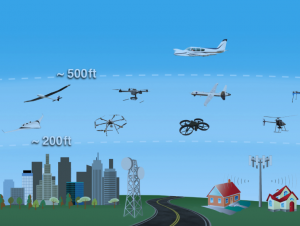
As commercial drones take flight more and more across Europe, regulators are joining forces with UAS companies to establish standardized drone rules and traffic management best practices across the continent.
A group of 13 public and private organizations recently created the SAFIR consortium to “demonstrate integrated Drone Traffic Management for a broad range of drone operations in Belgium” with the hope of spreading the process throughout the European Union.
According to the consortium’s website:
“SAFIR will carry out multiple studies and demonstrations for drone operations that are viable, robust and ready-to-implement throughout Europe. These demonstrations will include surveillance flights (including container terminal inspection, oil spill inspection) in the Port of Antwerp, parcel delivery, medical inter-hospital transport, high voltage line mapping and pylon inspection. Further the use of telecommunication-network technology for data communication with both manned aircraft and other unmanned aircraft will be assessed. Finally, a radar system will be deployed capable of monitoring cooperative and non-cooperative drones.”
Companies involved include Unifly, Amazon Prime Air, Belgocontrol, DronePort, Proximus, the Port of Antwerp, Helicus, SABCA, Elia, High Eye, C-Astral, Tekever and Aveillant.
“It is about testing 10 drones with different purposes, applications and IT systems,” DronePort CEO Mark Vanlook told The New York Times. “If drones can’t account for their surroundings, they will collide — and hurt people,” he added. DronePort will host many of the first tests at a former military airfield in Brussels.
The need for a uniform set of drone protocols comes into sharp contrast following a highly publicized crisis over London’s Gatwick airport last month. Two drones were observed flying over the airport, forcing the grounding of all flights for about 12-14 hours.
Meanwhile, the European Parliament and Council is addressing drone regulation with an expansion of regulatory oversight.
The regulations state:
“In view of the risks that unmanned aircraft can present for safety, privacy, protection of personal data, security or the environment, requirements should be laid down concerning the registration of unmanned aircraft and of operators of unmanned aircraft. It is also necessary to establish digital, harmonized and interoperable national registration systems in which information, including the same basic data, about unmanned aircraft and operators of unmanned aircraft registered in accordance with this Regulation and the implementing acts adopted on the basis thereof should be stored.”
Jason is a longstanding contributor to DroneLife with an avid interest in all things tech. He focuses on anti-drone technologies and the public safety sector; police, fire, and search and rescue.
Beginning his career as a journalist in 1996, Jason has since written and edited thousands of engaging news articles, blog posts, press releases and online content.
Email Jason
TWITTER:@JasonPReagan
Subscribe to DroneLife here.







[…] DRONELIFE […]